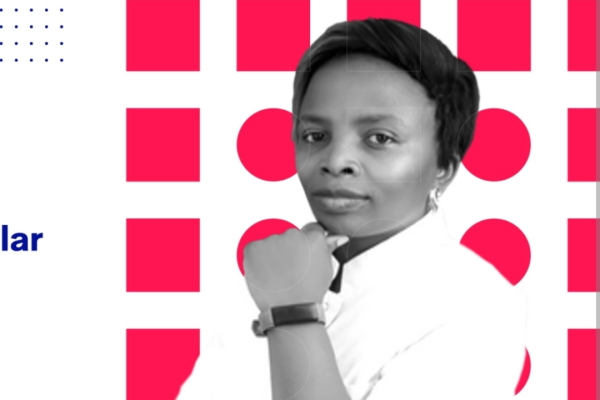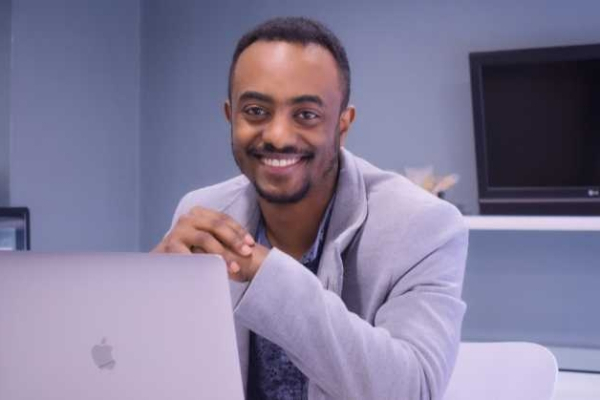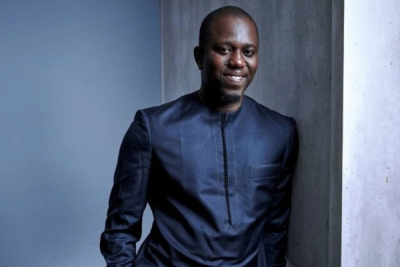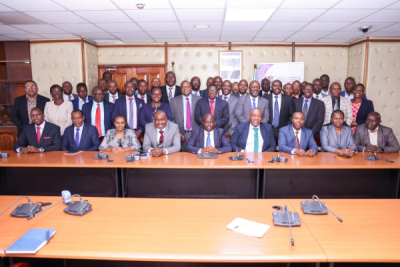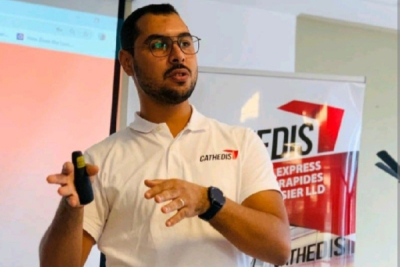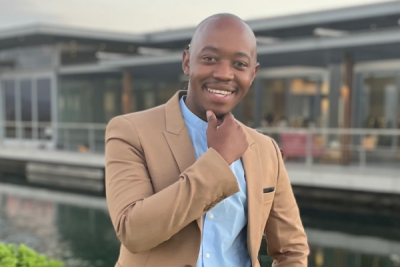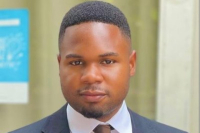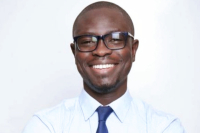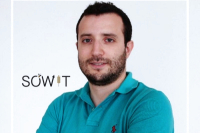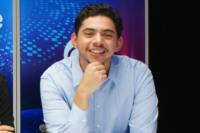
TECH STARS (1007)
An experienced nurse, she is committed to democratizing healthcare in Africa. A few years ago, she founded an innovative company that leverages technology to simplify access to nursing services.
Ginyu Innocentia Kwalar is a Cameroonian nurse and entrepreneur. She is the founder and CEO of Klarah, a startup dedicated to providing quality, affordable, and accessible healthcare to every African. Founded in 2021, Klarah connects experienced nurses to with patients through mobile applications and interactive dashboards. "We are leveraging technology to match nurses to patients so that quality healthcare can be offered in the comfort of their homes," explained Ginyu Innocentia Kwalar in 2023.
Klarah's nurses are trained to simplify medical jargon, discuss health issues, and help patients ask relevant questions about their well-being. The startup offers a range of services, including wound care, health check-ups, diabetic and hypertension care, post-hospitalization care, and patient education. Currently, Klarah has 400 dedicated nurses providing patient care.
Ginyu Innocentia Kwalar is also an assistant lecturer at the University of Buea, where she earned a bachelor's degree in nursing in 2001 and a PhD in public health in 2022. She holds a master's degree in internal medicine from the University of Yaoundé 1, obtained in 2008. To gain experience, she worked as a nurse at Nkambe District Hospital from 2003 to 2010. From 2013 to 2021, she served as a senior nurse at Buea Regional Hospital, where she was in charge of the emergency and outpatient units.
Melchior Koba
A computer science graduate, he focuses on creating mobile games inspired by African culture. As the head of Qene Games, he has developed two award-winning games.
Dawit Abraham (photo), an Ethiopian computer scientist and tech entrepreneur, is the co-founder and CEO of Qene Games, a mobile game publishing company based in Ethiopia.
Founded in 2016, Qene Games aims to showcase the richness and beauty of Ethiopian culture in the global gaming and entertainment industry. The startup has launched two mobile games so far.
Kukulu, their first game, is a 3D runner where the player, represented by a rooster, must escape a farmer by jumping over fences and running through bushes. Their second game, Gebeta, is a mobile board game based on the principles of mancala games (awélé, bao, kalaha, etc.). Gebeta was later acquired by the pan-African mobile game publisher Carry1st.
Kukulu won the AppsAfrica award for Best Media and Entertainment App in 2018, while Gebeta was awarded the AppsAfrica prize for Best App of the Year in 2020.
Dawit is also a co-founder and spokesperson for the Pan Africa Gaming Group, a network established in 2022 that brings together top video game development talents in Africa. In 2023, he became the co-founder and CEO of Beemi, an interactive streaming platform focused on games.
After graduating from Addis Ababa University with a bachelor's degree in electrical and computer engineering, Dawit's career began in 2015 at iCog-Labs, an Ethiopian R&D company specializing in AI and robotics, where he worked as a game developer and machine learning programmer. In 2020, he was a game developer at Turing, a U.S.-based AI company, and then joined the International Finance Corporation as a product development advisor from 2020 to 2023.
Melchior Koba
After completing his higher education in France, he worked on artificial intelligence projects for companies such as Facebook and Google. Now an entrepreneur, he leverages his expertise to improve access to healthcare services in Africa.
Moustapha Cisse (photo), a Senegalese expert in artificial intelligence and machine learning, founded Kera Health Platforms in 2023, a startup that develops a digital health platform powered by artificial intelligence (AI), where he serves as CEO. Kera Health Platforms connects healthcare providers with communities to promote healthier lives in Africa and beyond.
The idea for this startup dates back to 2004 when Moustapha Cisse, then 19 years old, fell seriously ill. His condition worsened due to a misdiagnosis and inappropriate treatment. "I had been misdiagnosed, and what I was being treated for was slowly killing me. I was eventually correctly diagnosed and treated, and through a long process, I recovered. That was one of the most difficult experiences of my lifetime and left me deeply curious about how something like that could happen. I went to university and studied math, physics, and artificial intelligence. Still, I was curious about the health sector and knew there was an opportunity to leverage technology to solve some of Africa’s most pressing healthcare needs," he recounted in May 2024.
Moustapha Cisse is a professor of machine learning at the African Institute of Mathematical Sciences. In 2018, he founded the African Masters of Machine Intelligence, a graduate program in AI that he has directed ever since.
A graduate of Pierre and Marie Curie University in France, Moustapha Cisse earned a master's degree in artificial intelligence in 2010 and a Ph.D. in computer science in 2014. In 2016, he joined Facebook as an AI researcher. In 2018, he co-founded and led until June 2023, Google's first AI engineering and research center in Africa, located in Accra, Ghana.
Melchior Koba
Information and Communication Technology (ICT) is key to the Kenyan government's socioeconomic development strategy. To achieve its ambitious goals, the country is enlisting the expertise of experienced professionals to guide its efforts.
On Monday, July 29, the Kenyan government announced the recruitment of 46 ICT directors who will be assigned to various ministries and state departments. These ICT leaders are expected to utilize their skills and expertise to create job opportunities for young, unemployed Kenyans.
The 46 engineers, appointed as part of an ongoing government reshuffle, will focus on enhancing service delivery to citizens and developing the digital economy.
"Their diverse expertise in Research and Digital Innovation, Software Development, E-commerce and Entrepreneurship, Cybersecurity, and Systems Audit and Control will be instrumental in advancing the Ministry's mission to build an informed and digitally empowered Kenyan society," said John Kipchumba Tanui, Principal Secretary of the State Department for ICT and Digital Economy.
This recruitment initiative is part of the Kenyan government's broader strategy to generate digital jobs for youth through the digital highway and creative economy, which are key components of the Bottom-Up Economic Transformation Agenda (BETA). This agenda serves as a crucial catalyst for other economic pillars, aiming to boost investments in sectors vital for economic growth and household well-being.
The newly appointed directors will work diligently to help the government achieve its ambitious digital objectives. Their contributions are expected to enhance administrative efficiency, improve public service delivery, strengthen digital infrastructure, and drive economic growth through digital transformation initiatives.
For the 2024/2025 fiscal year, the Kenyan executive has allocated approximately $125.3 million to ICT sector projects, marking a significant increase from the $108.4 million designated for the 2023/2024 fiscal year.
Samira Njoya
An IT specialist by training, he helps African online retailers streamline their parcel delivery process. His digital solution accelerates and simplifies the shipping of goods.
Imad El Mansour Zekri(photo) is a Moroccan IT specialist and tech entrepreneur, serving as the founder and CEO of Cathedis, a tech startup focused on parcel delivery for e-commerce businesses.
Established in 2015, Cathedis provides a fully digital logistics platform designed to cater to consumer needs. The company offers services such as delivery options, online or cash-on-delivery payments, and real-time tracking of parcels and delivery personnel. Cathedis aims to digitize and automate the centralization and distribution of parcels across Africa.
"We offer a fully digital delivery solution that includes pickup from stores, order processing, physical delivery, proof of delivery, and funds return," Zekri explained in 2020.
Zekri holds a specialized technician diploma in IT management, which he obtained in 2008 from Pigier School in Morocco. He also earned a master's degree in systems engineering, networks, and security in 2011 from the Faculty of Science and Technology at Hassan 1st University in Settat, Morocco.
To build his expertise, Zekri began his career in 2010 as a technical sales engineer at AGT Maroc, a company specializing in the integration of IT and telecom networks. In 2015, he transitioned to Integradis Europe, where he continued as a technical sales engineer, focusing on IT development and digital services.
Melchior Koba
He is a digital transformation expert who helps businesses succeed. He provides data collection and marketing tools specifically designed for e-commerce entrepreneurs.
Bashanganyi Magwape (photo) is a Botswanan computer scientist and serial entrepreneur. Co-founder and CEO of Meeticks Africa, he provides businesses with the tools, access, and support they need to thrive.
Founded in 2020 by Bashanganyi Magwape and Ismael Camara, Meeticks Africa helps small businesses source supplies, digitize their operations, and expand their customer base. Its mission is to "unlock value in Africa's informal communities and markets through online commerce."
One of Meeticks Africa's key innovations is a WhatsApp chatbot that enables e-commerce merchants to reach more customers across the country. This solution simplifies inventory management, orders, restocking, and accounting digitally.
In 2022, Meeticks Africa launched Jaabi, an innovative technology that allows users to collect data for surveys, market research, and subscription forms. Utilizing the WhatsApp Business API, Jaabi makes data collection more accessible and efficient.
The startup also offers an entrepreneurship program called DoDigi. The goal of this program is "to train, upskill, and economically support 3,000 women entrepreneurs in Southern Africa over the next three years," stated the CEO of Meeticks Africa in 2022.
Bashanganyi Magwape is a digital consultant for the Dream Factory Foundation, an organization aimed at empowering youth through education. He holds a degree in computer science obtained in 2006 from the Botswana Accountancy College (BAC). He also has a degree in sound engineering (2008) from CityVarsity School of Media and Creative Arts in South Africa.
In 2008, the entrepreneur worked as a music solutions assistant at Mama Dance, a music platform. From 2013 to 2021, he was the director of Youngpreneurs Media, an audiovisual content creation company. Between 2018 and 2023, he served as CEO of Basha Consulting, a company specializing in digital transformation.
Melchior Koba
In 2015, he left Cameroon for the Democratic Republic of Congo, where he earned his doctorate in medicine. Passionate about technology, he developed an innovative application that allows patients to easily locate nearby pharmacies and purchase medications.
Ulrich Kouesso is a Cameroonian entrepreneur and expert in preventive medicine. He co-founded LukaPharma in the Democratic Republic of Congo (DRC), where he serves as CEO. Established in 2021 alongside Christian Kouesso and Charlotte Nsongo, LukaPharma aims to enhance access to quality medications through digital solutions. The startup offers a mobile application that enables patients and caregivers to quickly locate the nearest pharmacies with the required medications. The platform connects users with pharmacies, allowing them to compare medication prices, pay remotely, and arrange for delivery. This service helps prevent complications from delayed medication intake and reduces healthcare costs.
LukaPharma exclusively partners with pharmacies owned by licensed pharmacists recognized by the National Order of Pharmacists of the DRC. To date, the company has over 40 partner pharmacies in Kinshasa.
In addition to his role at LukaPharma, Ulrich Kouesso works as a freelance consultant in medical data collection. In 2019, he launched My Virtual Planning, a digital sexual education platform aimed at reducing unwanted pregnancies. This platform assists with pregnancy and menstrual cycle tracking, as well as family planning, and earned the Orange Social Entrepreneur Prize in 2020.
Kouesso moved to the DRC from Cameroon in 2015, holding a public health degree from the University of Dschang. He graduated from the Bel Campus Technological University of Kinshasa with a doctorate in medicine in 2021. From December 2021 to January 2022, he served as a consultant for the Ishango Startups Center in the Healthtech Meetup program.
In 2022, Ulrich Kouesso received the Best Start-up of the Year award from the Federation of Congolese Enterprises for LukaPharma. In May 2024, he participated in GITEX Marrakech in Morocco.
Melchior Koba
After completing his studies in Benin and Senegal, he ventured into entrepreneurship, focusing on financial technologies. He simplifies digital payments in West Africa, making transactions easier for everyone.
Aziz Yérima (photo) is a Beninese consultant specializing in card payment systems, marketing, and digital transformation. He is the co-founder and CEO of PayDunya, an innovative Senegalese fintech focused on digital payment solutions.
Founded in 2015 by Yérima, Youma Fall, Christian Palouki, and Honoré Hounwanou, PayDunya aims to tackle financial inclusion challenges in Africa. The startup offers a technology platform that enables businesses to accept payments securely and transparently, providing solutions tailored to the unique needs of the African market.
"Our PayDunya platform is designed to strengthen the African digital ecosystem by supporting the digital transformation of both formal and informal businesses, as well as financial institutions," Yérima explains. Currently, PayDunya operates in Senegal, Côte d’Ivoire, Benin, Burkina Faso, Togo, and Mali.
The concept for PayDunya emerged in 2013 when Yérima, then a student, participated in a project to aid a group of women in Pikine, Senegal. Encountering difficulties in integrating online payment solutions, he recognized the need for a payment system adapted to African realities.
In addition to his role at PayDunya, Yérima serves as the president of the SEN FINTECH association, which unites stakeholders in financial technology. This organization advocates for the interests of its members and represents them to regulators and other stakeholders in the fintech sector.
Yérima holds a bachelor's degree in electrical and computer engineering from the University Institute of Technology in Lokossa, Benin, which he obtained in 2011. He also earned a master's degree in multimedia networks in 2014 from the Ecole Supérieure Multinationale des Télécommunications in Dakar, Senegal. In 2016, he completed a training program on mobile money from GSMA (Global System for Mobile Communications).
Melchior Koba
As a data entrepreneur, he uses artificial intelligence and remote sensing to provide farmers and agricultural organizations with practical tools that help them make informed decisions.
Hamza Bendahou (photo) is a Moroccan entrepreneur specializing in technological services for agriculture. He is the co-founder of SOWIT, a startup that provides precise data to decision-makers in agriculture and environmental sectors.
Founded in 2017 by Hamza Bendahou and Hamza Rkha Chaham, SOWIT develops decision-support tools to assist African farmers. Their clients include food companies, governments, farmers, as well as banks and insurers. Through its platforms, SOWIT provides the necessary data for making informed decisions.
SOWIT offers six mobile applications: SoDry, SoYield, SoWater, Monitor, Fertisat, and Skowt. SoDry helps determine the optimal date for harvesting corn silage. SoYield uses artificial intelligence to provide production estimates up to two months before harvest. SoWater calculates the water needs of a plot to optimize irrigation.
Monitor allows access to a SOWIT expert for co-managing agricultural operations through weekly crop diagnostics based on satellite remote sensing. Fertisat determines the fertilizer needs of crops. Skowt improves inspection efficiency by guiding operators to sensitive areas and providing a comprehensive report.
Hamza Bendahou holds an engineering degree in electronics and signal processing, obtained in 2011 from INP-ENSEEIHT in Toulouse. He also graduated from the Institut Supérieur de l'Aéronautique et de l'Espace (ISAE-SUPAERO) with a master's degree in financial engineering in 2012.
After an end-of-year internship in Airbus' flight test department in 2011, Hamza Bendahou joined AXA Investment Managers in 2012, where he held positions as a fund range manager and product manager. From 2013 to 2018, he worked at Gras Savoye, a financial services company, as a market studies officer and later as head of the actuarial studies department.
Melchior Koba
A computer science graduate, he applies artificial intelligence, the Internet of Things, and computer vision to develop new aquaculture technologies.
Mohamed Ben Ahmed (photo) is a Tunisian entrepreneur and computer scientist specializing in computer vision and artificial intelligence (AI) development. As the co-founder and CEO of Aquadeep, he uses technology to revolutionize the aquaculture sector.
Founded in 2021 by Mohamed Ben Ahmed and Youssef Chahed, Aquadeep is a tech startup aimed at facilitating aquaculture. The company develops AI and computer vision-based solutions to help aquaculturists count larvae and fish in their ponds. It also provides data extraction tools based on the Internet of Things (IoT) for better control of the farming process.
“We develop solutions based on artificial intelligence and computer vision, an AI technique that enables computers to see and interpret images and videos in the same way humans do,” explained Mohamed Ben Ahmed in July 2024.
Aquadeep's solutions help fisheries better control their yields, ensuring healthier fish farming and more efficient cost and stock management. The company offers a larval fish counter and a fully industrial juvenile fish counter. Additionally, it provides a mobile AI-based application that simplifies daily tasks for fishery employees.
Mohamed Ben Ahmed holds an engineering degree in computer science, obtained in 2021 from the South Mediterranean University in Tunisia. Before venturing into entrepreneurship, he worked as a hardware engineering intern at Cloud Temple in France in 2018. In 2020, he completed a full-stack developer internship in Tunisia at Think-it, a software engineering organization.
Melchior Koba
More...
An IT professional by training, he is passionate about using technology to solve business problems. Through his company, he aims to make the internet safer for everyone.
Sam Hutchinson (photo), a South African IT professional and entrepreneur, is the co-founder and CEO of Sendmarc, a startup that automates the protection of businesses against identity theft and phishing attacks.
Founded in 2018 by Hutchinson, Sacha Matulovich, and Keith Thompson, Sendmarc aims to make the internet safer for everyone. The company offers a platform that helps businesses and their partners protect their data, generate revenue, train, and grow. Sendmarc's solutions shield companies from cyber threats such as phishing, spoofing, and identity theft.
Before co-founding Sendmarc, Hutchinson established Music Industry Online in 1999, a portal providing information on the music industry in South Africa. In 2003, he founded Prefix Technologies, where he served as the chief software architect until 2013. This holding company manages two products: Everlytic and Preditor.
Founded in 2010, Everlytic is a platform for email, SMS, and social marketing that enables businesses to send, deliver, and track their digital communications. Preditor is a content management system, now managed by Grenade Technologies, a digital agency offering innovative content solutions to publishers in emerging markets.
Hutchinson graduated from the University of the Witwatersrand with a bachelor's degree in mathematics and computer science in 2002. From 2012 to 2016, he served as a non-executive director of Grenade Technologies.
Melchior Koba
He has extensive experience in planning and optimizing public transportation systems, as well as managing technology projects. He leads a company that provides advanced fleet management solutions.
Justin Coetzee is a trained civil engineer and a South African entrepreneur. He is the co-founder and CEO of GoMetro, a tech startup dedicated to enhancing commercial fleet operations. The company is based in the United Kingdom, with a development office in South Africa and sales offices in the United States and Latin America.
Founded in 2014, GoMetro provides its clients with GoMetro Bridge, a software platform that consolidates actionable data from all vehicles they wish to monitor. This platform enables clients to optimize operations and achieve cost savings in areas such as route planning, tire lifespan, and cargo management.
GoMetro Bridge integrates telematics data from an operator’s fleet and its subcontractors, regardless of the telematics provider. The company also offers ConnecTyre telematics sensors, which are mounted on wheel rims and provide real-time updates on tire conditions to the Bridge platform. This feature facilitates proactive tire monitoring, helping to prevent accidents and minimize downtime.
In 2020, GoMetro formed a partnership with the international bus operator Ascendal Group to launch GoAscendal, where Justin Coetzee served as director until 2023. The company has since rebranded as BetterRides.ai and offers a range of tools and solutions designed to assist bus and train operators in automating customer satisfaction surveys and passenger engagement reports.
Justin Coetzee earned his bachelor's degree in civil engineering from the University of Pretoria in 2007 and a master's degree in transportation engineering from Stellenbosch University in 2011.
From 2010 to 2012, he worked as a public transport engineer and planner at Aurecon, a design, engineering, and advisory firm. In 2012, he joined Element Consulting Engineers, where he served as an entrepreneur in residence until 2014.
Melchior Koba
An IT professional by training, he ventured into the beauty and wellness sector. He created a management application designed to help beauty professionals digitize their entire value chain.
El Hadji M. Diagne (photo) is a Senegalese serial entrepreneur and IT engineer. He is the founder and CEO of Kiliya.co, a software company that provides a comprehensive management tool for beauty salons and spas.
Originally launched in 2015 as an online booking platform for beauty and wellness treatments, the startup evolved into Kiliya.co in 2023. It now offers an all-in-one management software for beauty professionals, including hair salons, beauty institutes, nail salons, and spas. This software provides a wide range of services to its users.
Kiliya allows users to manage, retain, and attract new clients. It facilitates quick customer payments, product management, appointment scheduling, stock management, and all administrative tasks of a salon. Additionally, it offers marketing tools to enhance salons' online visibility. With these features, the startup helps clients save time, maximize revenue, and increase productivity.
Before founding Kiliya.co, El Hadji M. Diagne co-founded Sun Telecom in 2013, an IT services company. He holds an engineering degree in information systems and computer networks, obtained in 2012 from the School of Higher Studies in Information Systems Engineering (HEISI) in Morocco.
From 2014 to 2016, El Hadji M. Diagne led the launch of the "My HealthLine" platform, a program by Orange Healthcare, the healthcare division of Orange Group. His mission was to connect doctors and patients to combat sexually transmitted diseases.
Melchior Koba
With a passion for emerging technologies like the Internet of Things, artificial intelligence, robotics, embedded systems, and industrial automation, he designs innovative solutions that drive efficiency and safety improvements for businesses.
Jeslone Lukisa (photo) is a Congolese inventor and entrepreneur, serving as the co-founder and CEO of Smaraf, a technology company established in 2018. Smaraf specializes in engineering, with a strong emphasis on security systems and technological integration.
The company offers a wide array of services, including the sales, installation, and maintenance of video surveillance systems, access control, alarms, fire systems, GPS trackers, electric fences, drones, IT solutions, telecommunications, and the Internet of Things (IoT). Smaraf also provides training in its areas of expertise.
Among the innovative solutions developed by Smaraf are the Smaraf Asset Checking Table, Fuel Management System, and Driver Monitoring System. The Smaraf Asset Checking Table leverages radio frequency identification technology to help businesses track and verify their laptops, optimizing IT asset management.
The Fuel Management System is designed to monitor and enhance fuel usage, providing effective oversight and optimization to help industries improve efficiency and profitability. Meanwhile, the Driver Monitoring System employs vision and artificial intelligence to analyze driver behavior in real time, helping to prevent accidents caused by drowsiness, distraction, and other hazardous practices.
Jeslone Lukisa holds an engineering degree in electromechanics from the University of Kolwezi, which he obtained in 2020. Since 2021, Smaraf takes part in the Pan-African Robotics Competition. His team, Smaraf Eduk, secured second place in both 2021 and 2022, and won the competition in 2023. They are currently participating in the final phase of the 2024 edition, which began in Dakar on Monday, July 22, and will conclude on Saturday, July 27.
Melchior Koba


